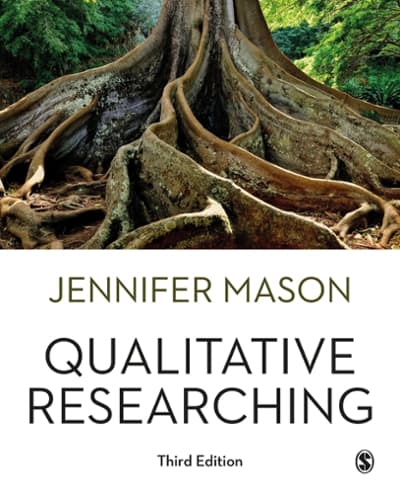Answered step by step
Verified Expert Solution
Question
1 Approved Answer
It's like talking to the same person. It's like we have one brain. But twins can also have surprising, and until now, hidden differences.
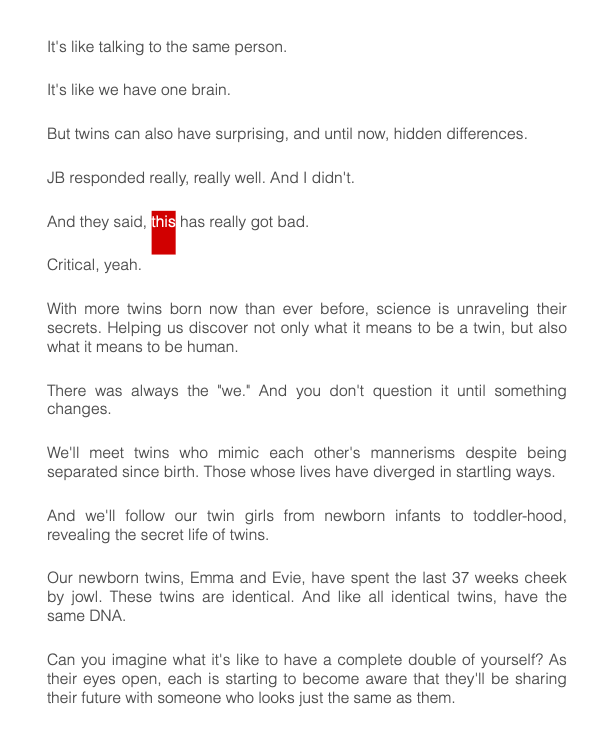
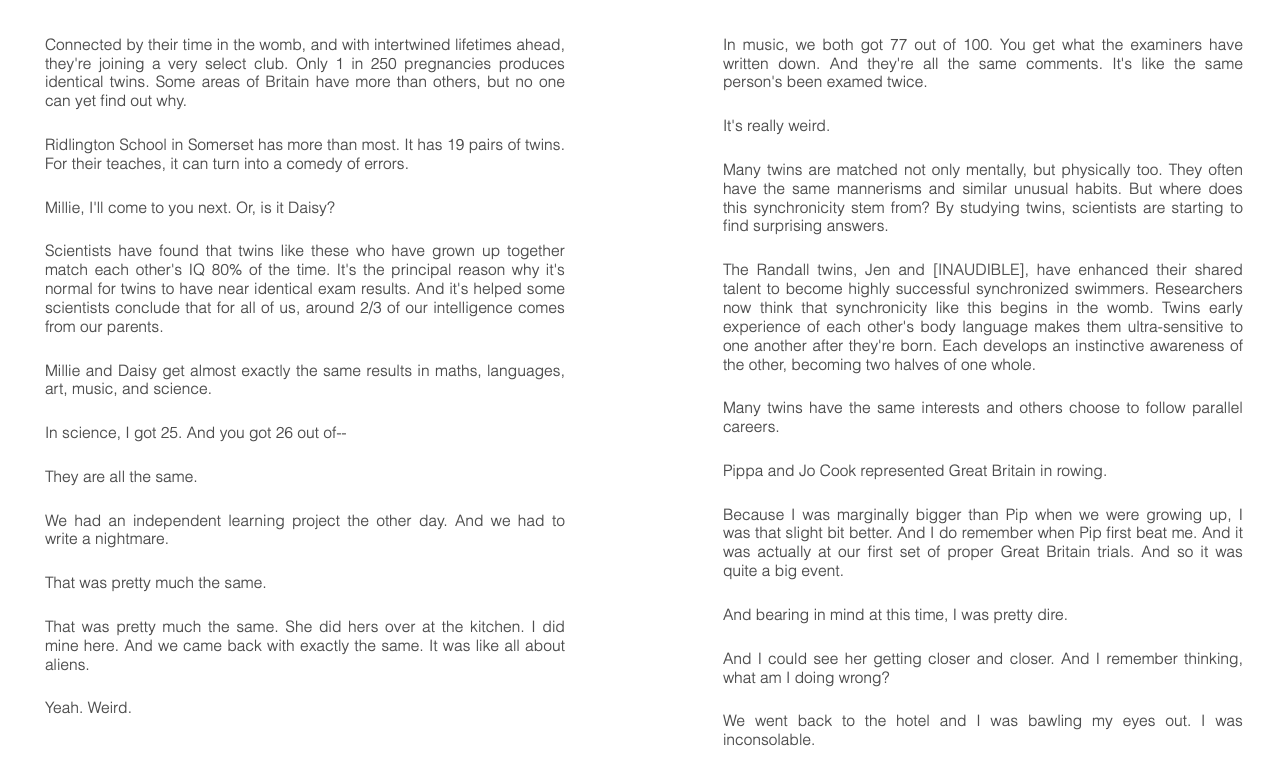
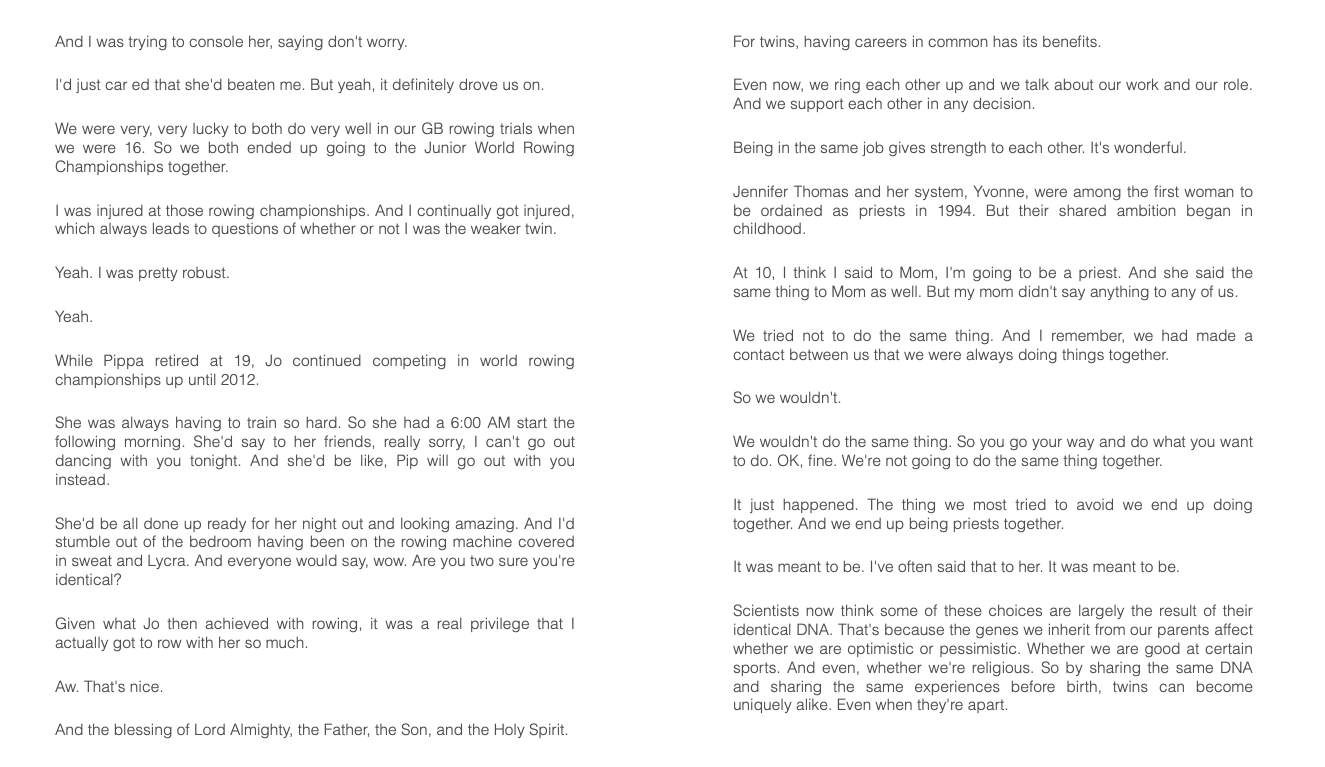
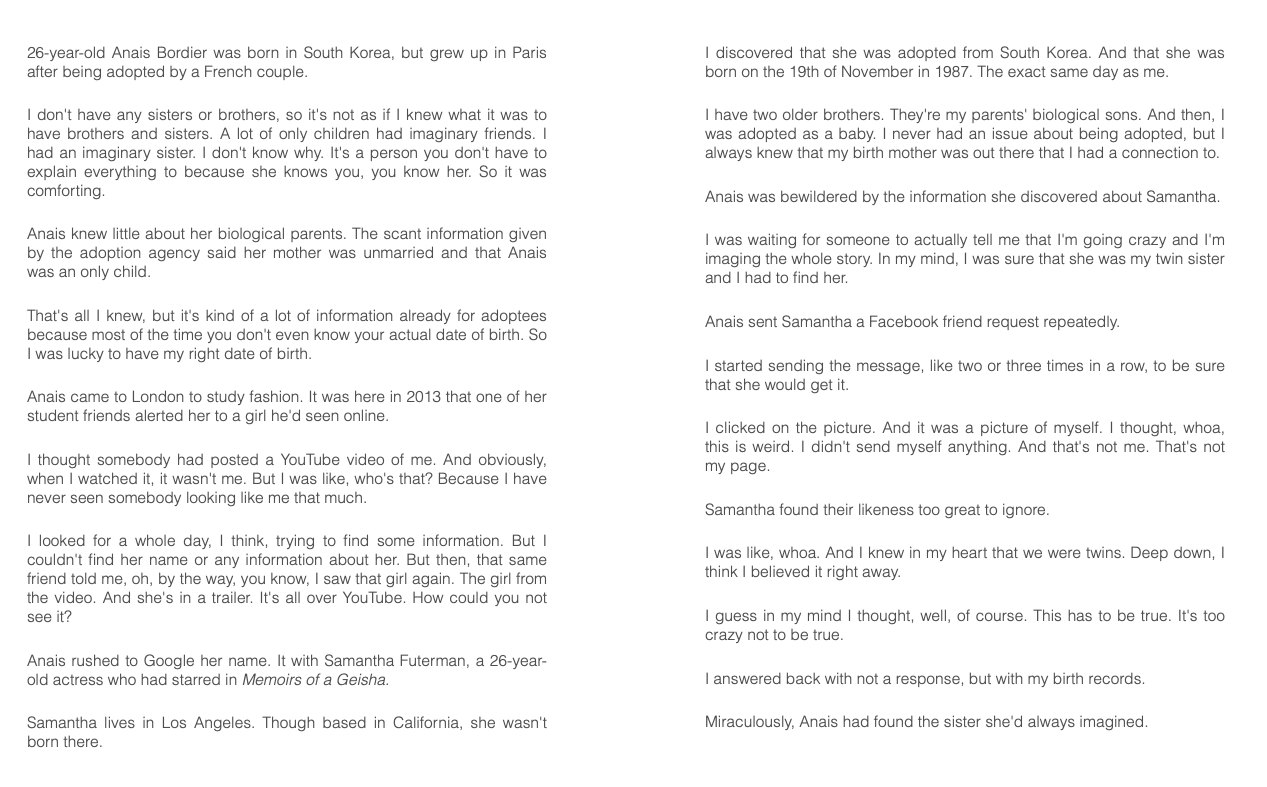
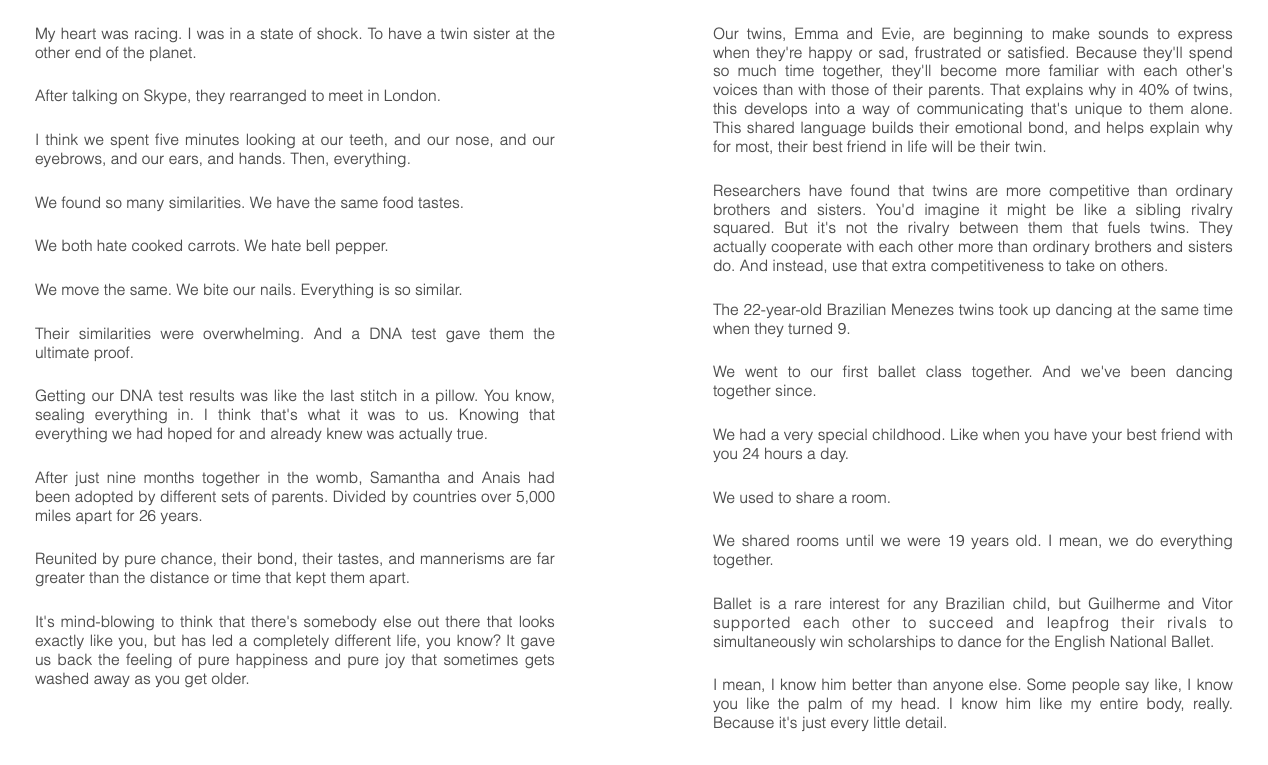
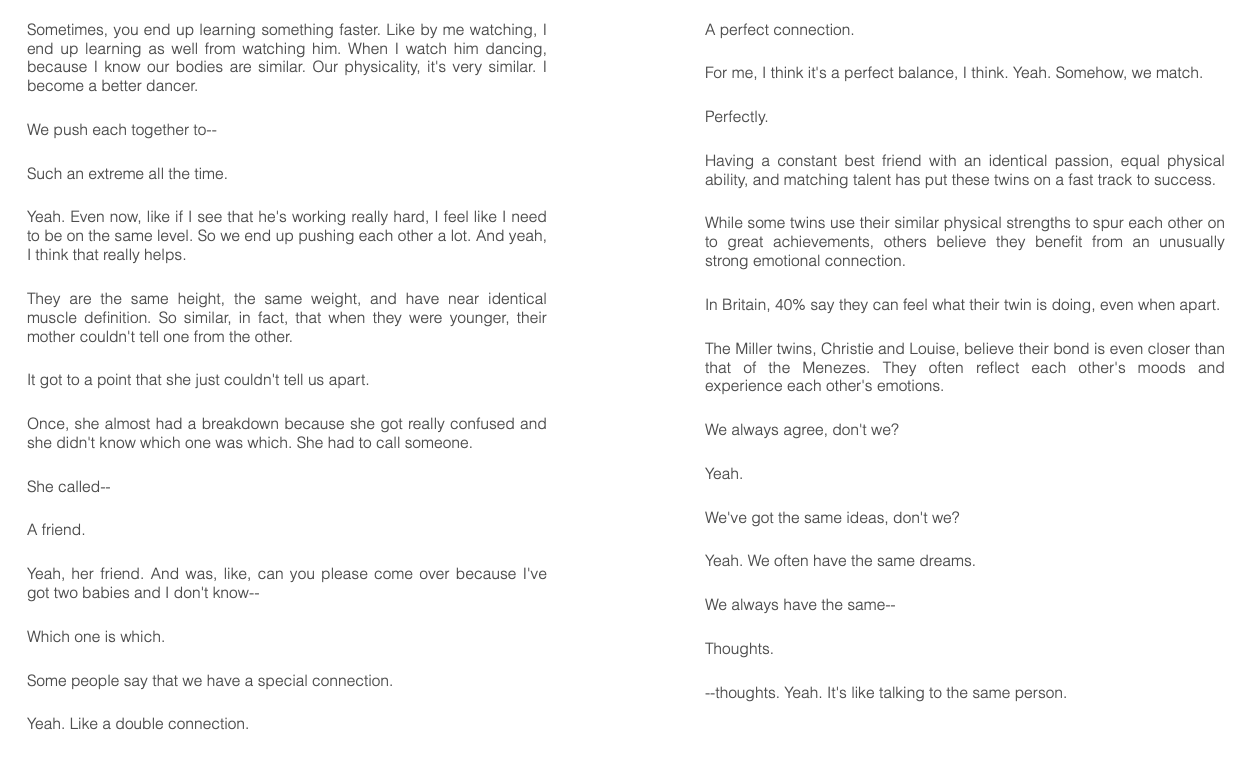
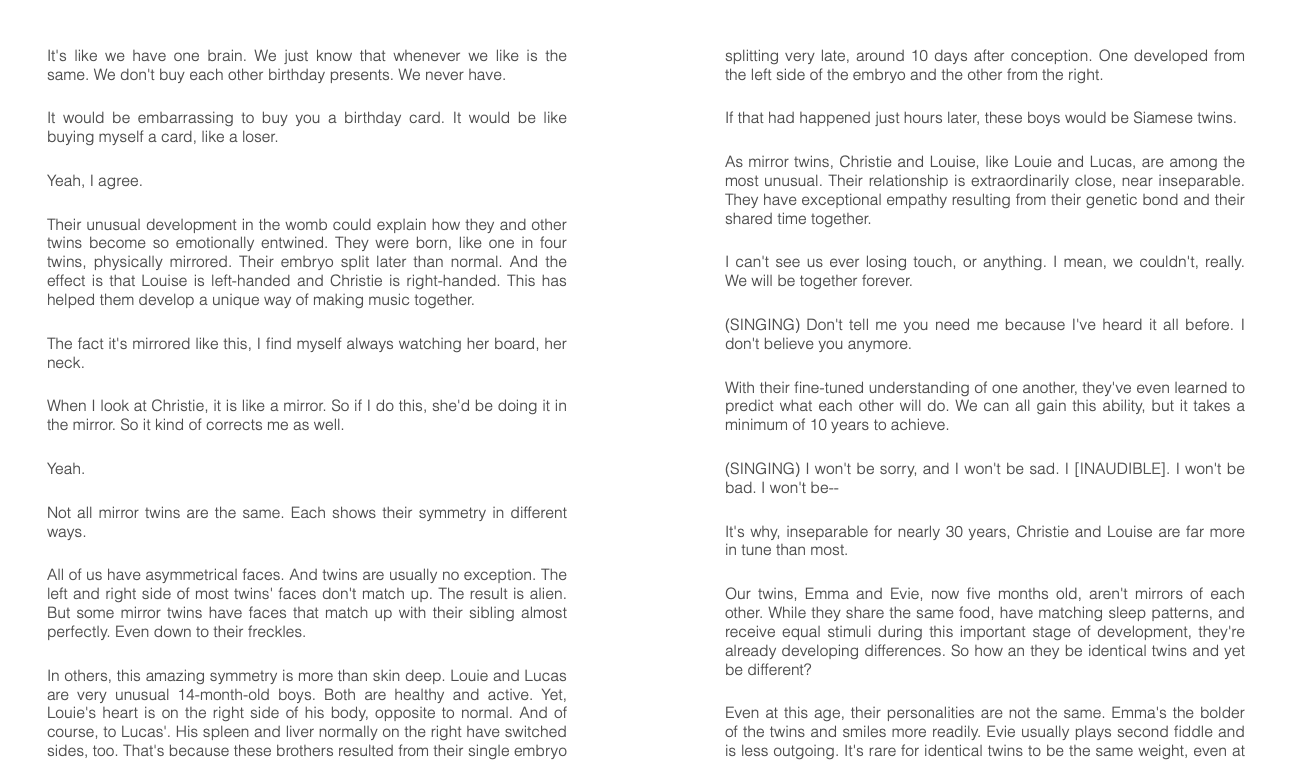
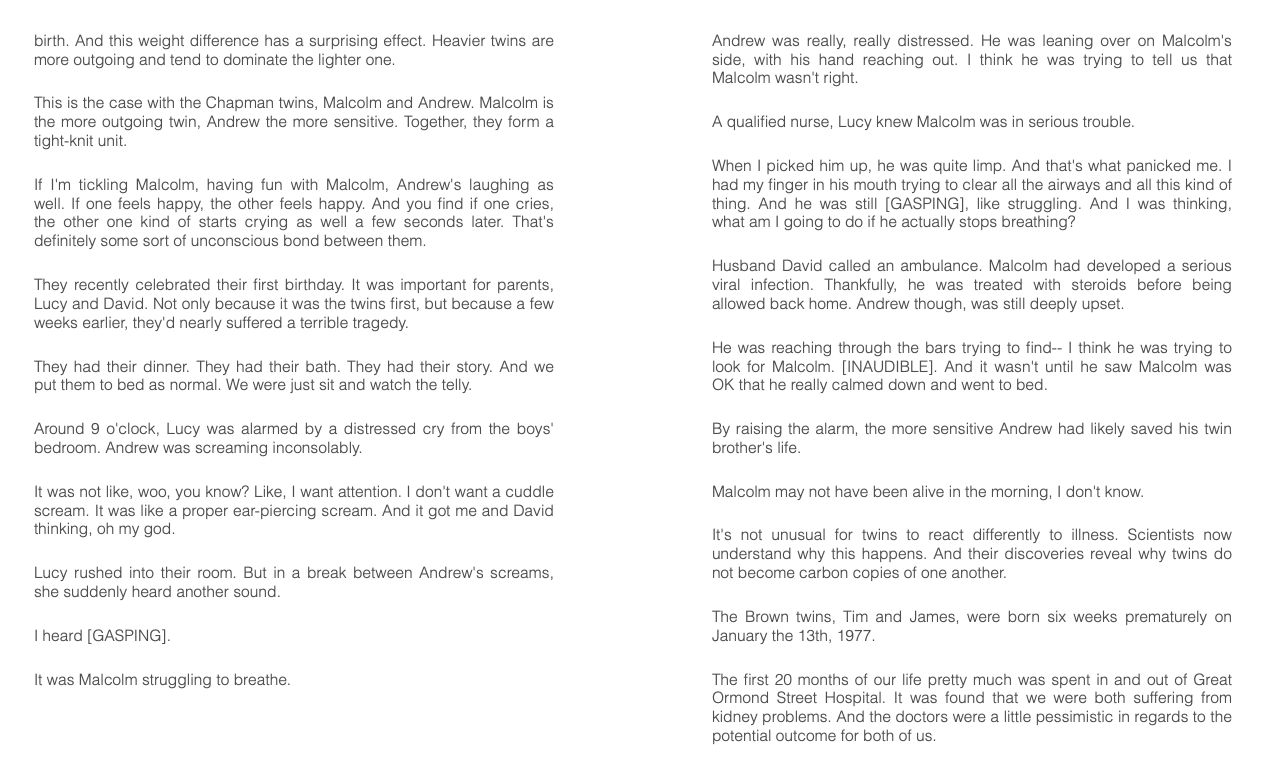
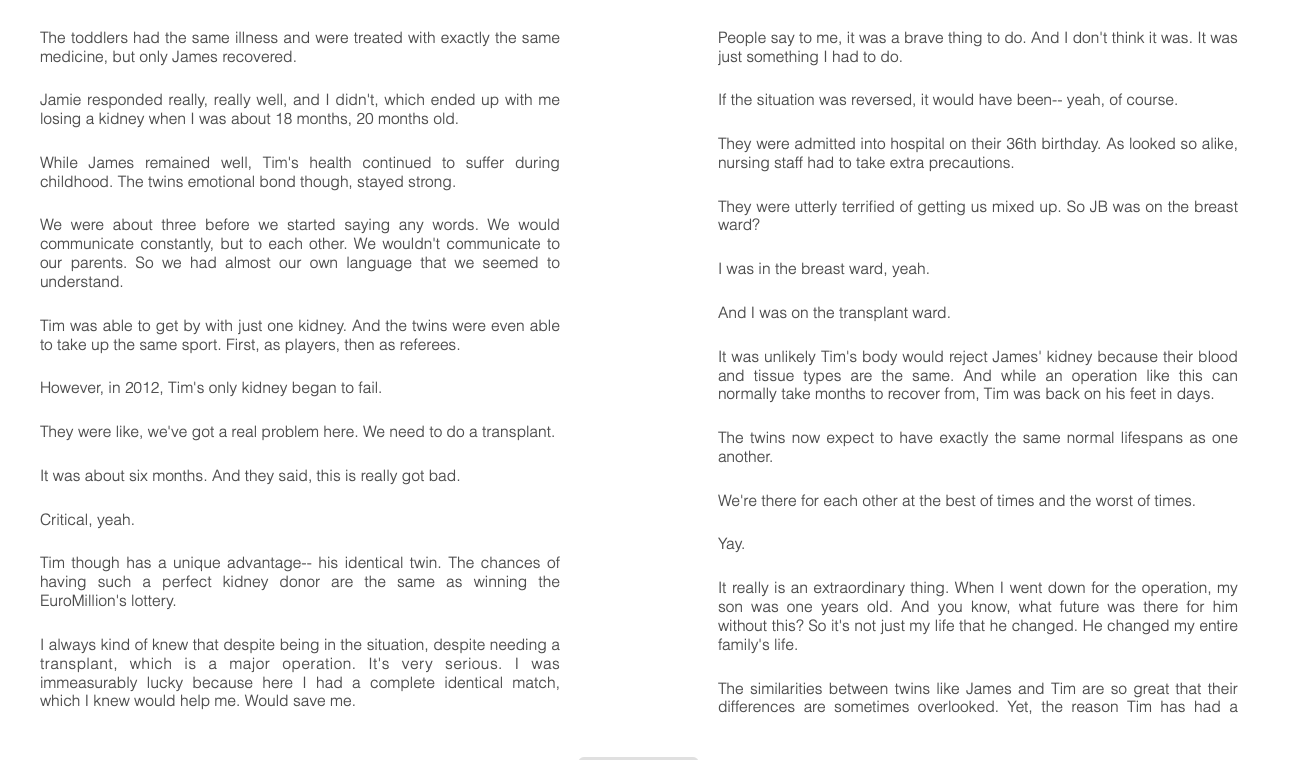
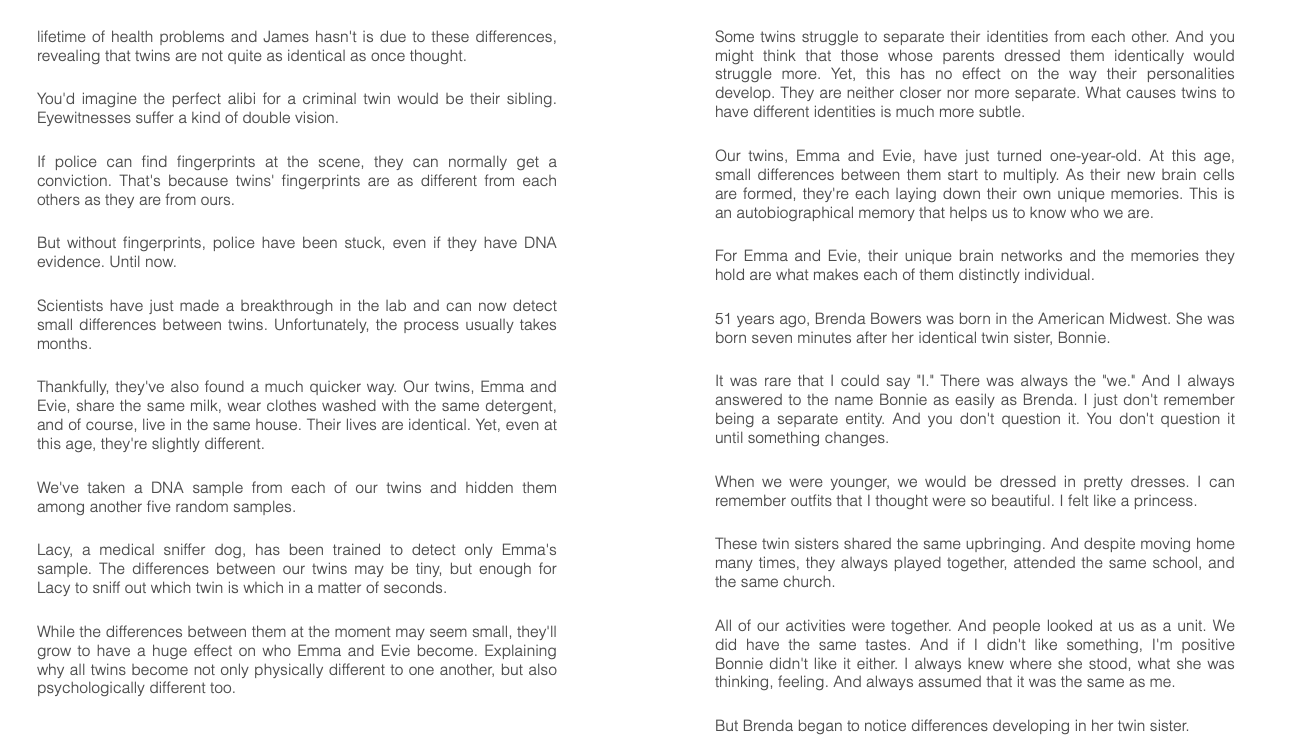
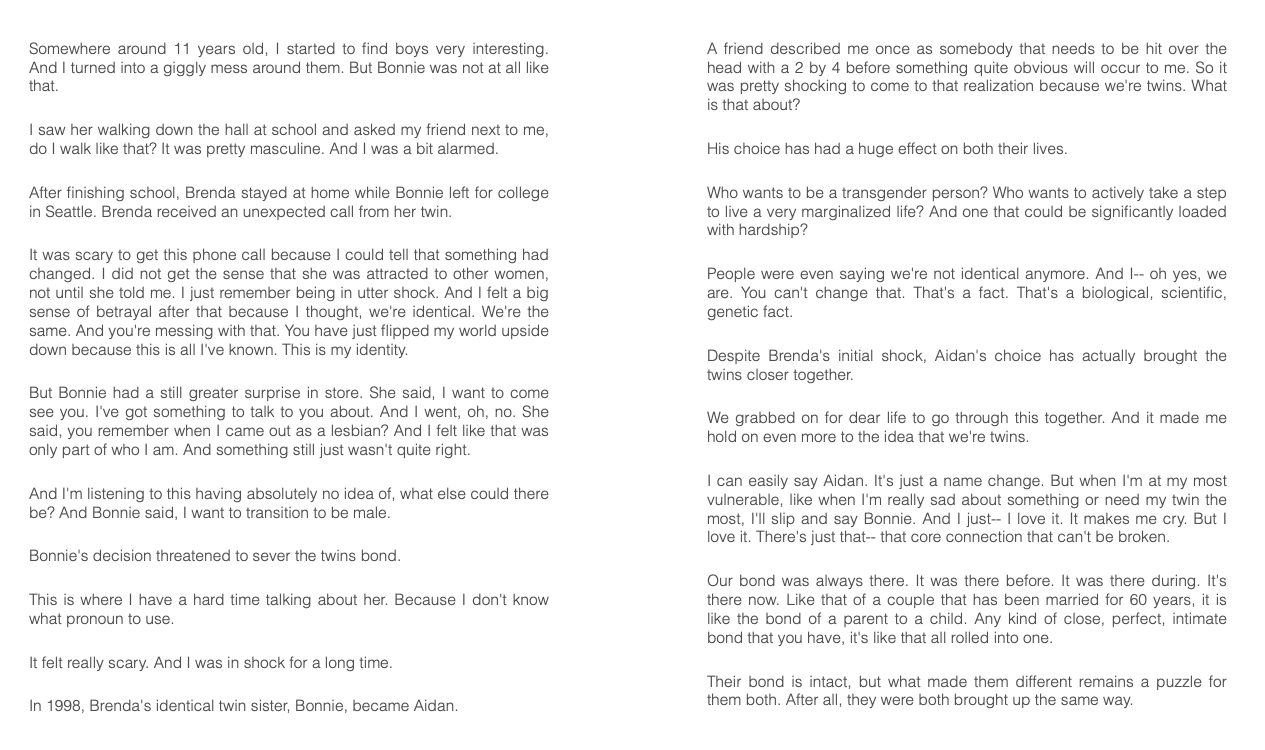
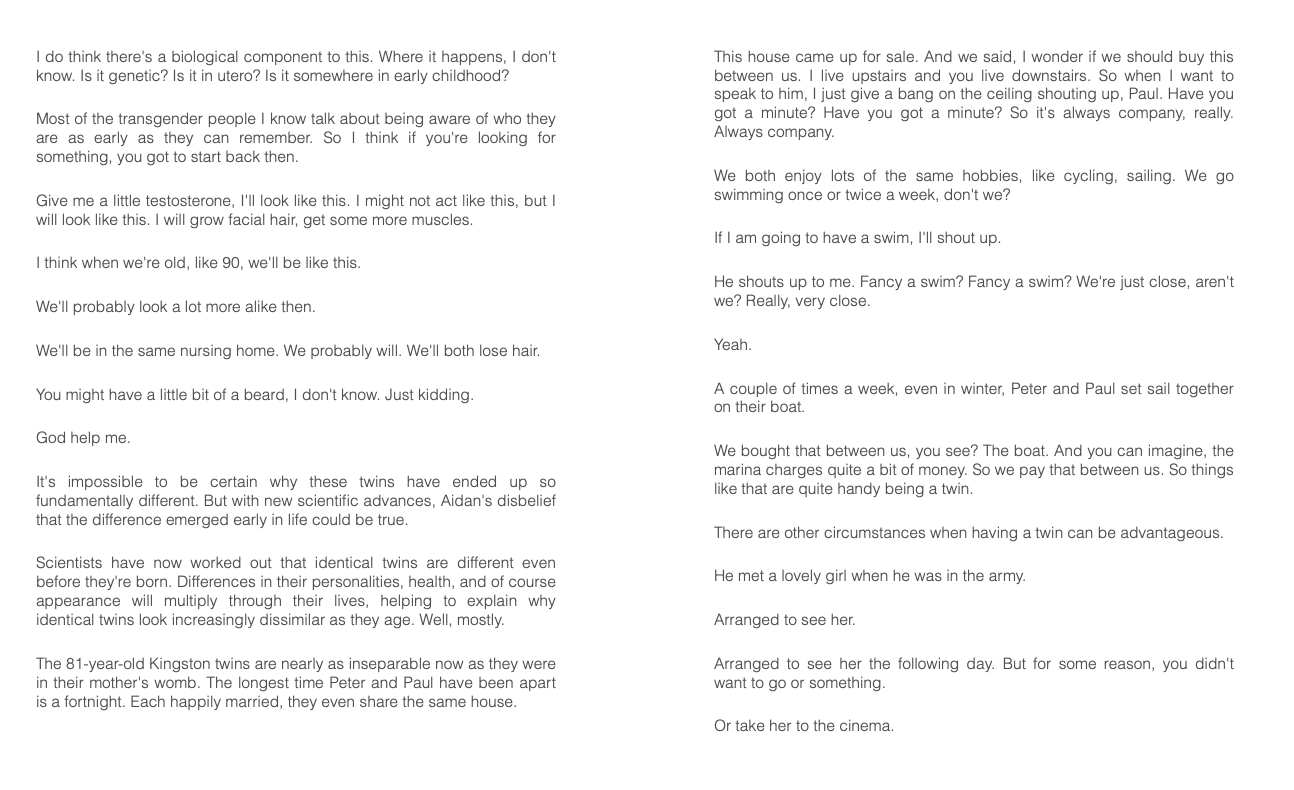
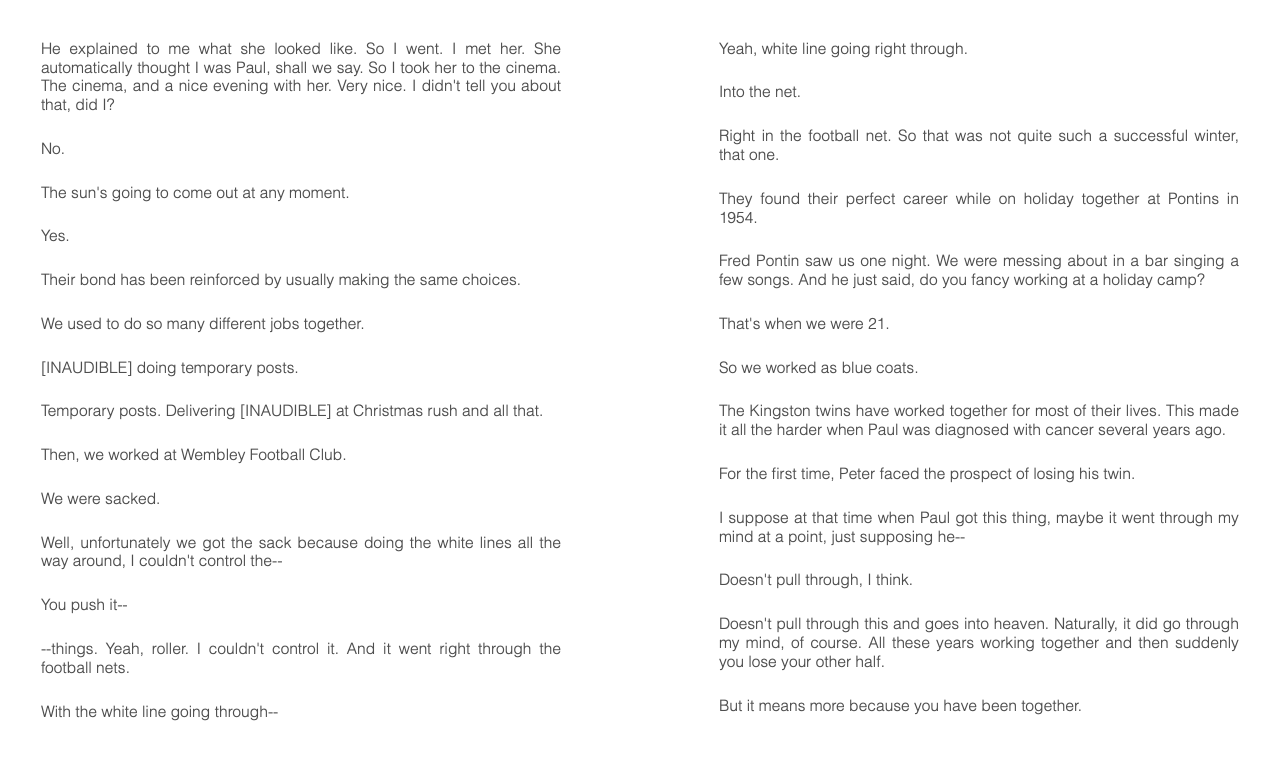
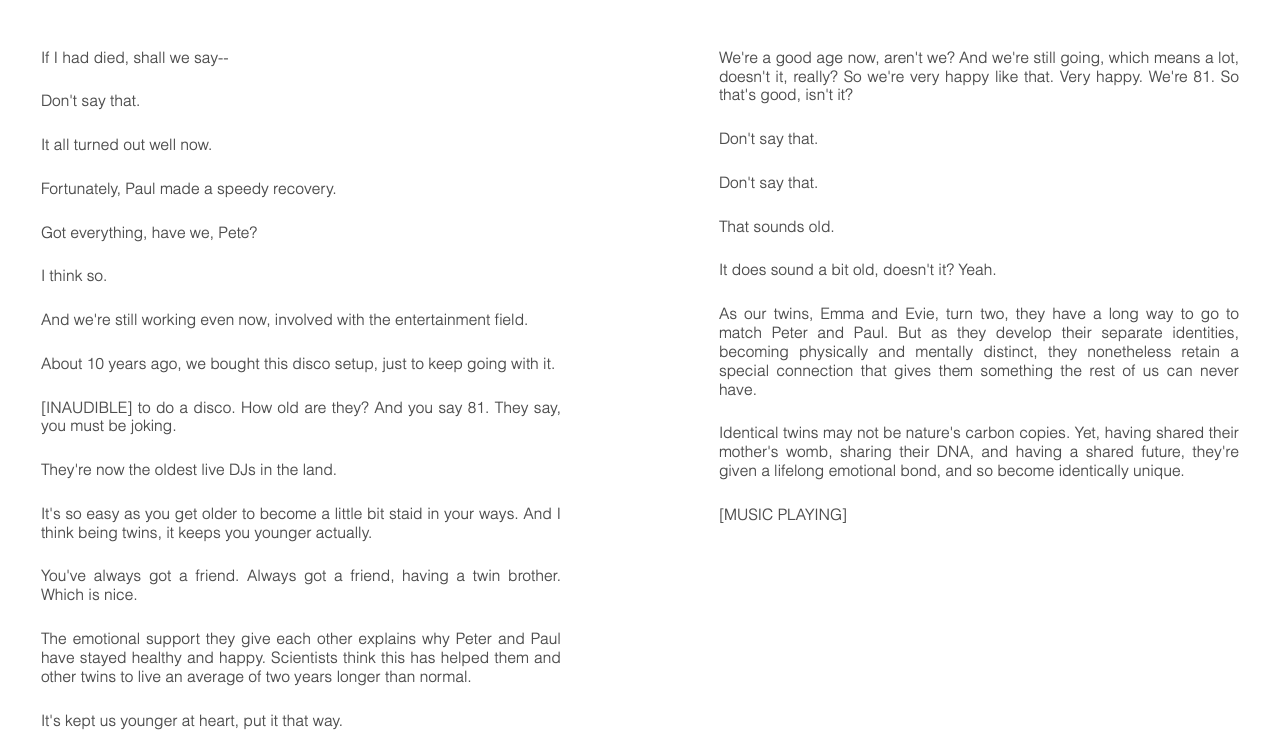
It's like talking to the same person. It's like we have one brain. But twins can also have surprising, and until now, hidden differences. JB responded really, really well. And I didn't. And they said, this has really got bad. Critical, yeah. With more twins born now than ever before, science is unraveling their secrets. Helping us discover not only what it means to be a twin, but also what it means to be human. There was always the "we." And you don't question it until something changes. We'll meet twins who mimic each other's mannerisms despite being separated since birth. Those whose lives have diverged in startling ways. And we'll follow our twin girls from newborn infants to toddler-hood, revealing the secret life of twins. Our newborn twins, Emma and Evie, have spent the last 37 weeks cheek by jowl. These twins are identical. And like all identical twins, have the same DNA. Can you imagine what it's like to have a complete double of yourself? As their eyes open, each is starting to become aware that they'll be sharing their future with someone who looks just the same as them. Connected by their time in the womb, and with intertwined lifetimes ahead, they're joining a very select club. Only 1 in 250 pregnancies produces identical twins. Some areas of Britain have more than others, but no one can yet find out why. Ridlington School in Somerset has more than most. It has 19 pairs of twins. For their teaches, it can turn into a comedy of errors. Millie, I'll come to you next. Or, is it Daisy? Scientists have found that twins like these who have grown up together match each other's IQ 80% of the time. It's the principal reason why it's normal for twins to have near identical exam results. And it's helped some scientists conclude that for all of us, around 2/3 of our intelligence comes from our parents. Millie and Daisy get almost exactly the same results in maths, languages, art, music, and science. In science, I got 25. And you got 26 out of-- They are all the same. We had an independent learning project the other day. And we had to write a nightmare. That was pretty much the same. That was pretty much the same. She did hers over at the kitchen. I did mine here. And we came back with exactly the same. It was like all about aliens. Yeah. Weird. In music, we both got 77 out of 100. You get what the examiners have written down. And they're all the same comments. It's like the same person's been examed twice. It's really weird. Many twins are matched not only mentally, but physically too. They often have the same mannerisms and similar unusual habits. But where does this synchronicity stem from? By studying twins, scientists are starting to find surprising answers. The Randall twins, Jen and [INAUDIBLE], have enhanced their shared talent to become highly successful synchronized swimmers. Researchers now think that synchronicity like this begins in the womb. Twins early experience of each other's body language makes them ultra-sensitive to one another after they're born. Each develops an instinctive awareness of the other, becoming two halves of one whole. Many twins have the same interests and others choose to follow parallel careers. Pippa and Jo Cook represented Great Britain in rowing. Because I was marginally bigger than Pip when we were growing up, I was that slight bit better. And I do remember when Pip first beat me. And it was actually at our first set of proper Great Britain trials. And so it was quite a big event. And bearing in mind at this time, I was pretty dire. And I could see her getting closer and closer. And I remember thinking, what am I doing wrong? We went back to the hotel and I was bawling my eyes out. I was inconsolable. And I was trying to console her, saying don't worry. I'd just car ed that she'd beaten me. But yeah, it definitely drove us on. We were very, very lucky to both do very well in our GB rowing trials when we were 16. So we both ended up going to the Junior World Rowing Championships together. I was injured at those rowing championships. And I continually got injured, which always leads to questions of whether or not I was the weaker twin. Yeah. I was pretty robust. Yeah. While Pippa retired at 19, Jo continued competing in world rowing championships up until 2012. She was always having to train so hard. So she had a 6:00 AM start the following morning. She'd say to her friends, really sorry, I can't go out dancing with you tonight. And she'd be like, Pip will go out with you instead. She'd be all done up ready for her night out and looking amazing. And I'd stumble out of the bedroom having been on the rowing machine covered in sweat and Lycra. And everyone would say, wow. Are you two sure you're identical? Given what Jo then achieved with rowing, it was a real privilege that I actually got to row with her so much. Aw. That's nice. And the blessing of Lord Almighty, the Father, the Son, and the Holy Spirit. For twins, having careers in common has its benefits. Even now, we ring each other up and we talk about our work and our role. And we support each other in any decision. Being in the same job gives strength to each other. It's wonderful. Jennifer Thomas and her system, Yvonne, were among the first woman to be ordained as priests in 1994. But their shared ambition began in childhood. At 10, I think I said to Mom, I'm going to be a priest. And she said the same thing to Mom as well. But my mom didn't say anything to any of us. We tried not to do the same thing. And I remember, we had made a contact between us that we were always doing things together. So we wouldn't. We wouldn't do the same thing. So you go your way and do what you want to do. OK, fine. We're not going to do the same thing together. It just happened. The thing we most tried to avoid we end up doing together. And we end up being priests together. It was meant to be. I've often said that to her. It was meant to be. Scientists now think some of these choices are largely the result of their identical DNA. That's because the genes we inherit from our parents affect whether we are optimistic or pessimistic. Whether we are good at certain sports. And even, whether we're religious. So by sharing the same DNA and sharing the same experiences before birth, twins can become uniquely alike. Even when they're apart. 26-year-old Anais Bordier was born in South Korea, but grew up in Paris after being adopted by a French couple. I don't have any sisters or brothers, so it's not as if I knew what it was to have brothers and sisters. A lot of only children had imaginary friends. I had an imaginary sister. I don't know why. It's a person you don't have to explain everything to because she knows you, you know her. So it was comforting. Anais knew little about her biological parents. The scant information given by the adoption agency said her mother was unmarried and that Anais was an only child. That's all I knew, but it's kind of a lot of information already for adoptees because most of the time you don't even know your actual date of birth. So I was lucky to have my right date of birth. Anais came to London to study fashion. It was here in 2013 that one of her student friends alerted her to a girl he'd seen online. I thought somebody had posted a YouTube video of me. And obviously, when I watched it, it wasn't me. But I was like, who's that? Because I have never seen somebody looking like me that much. I looked for a whole day, I think, trying to find some information. But I couldn't find her name or any information about her. But then, that same friend told me, oh, by the way, you know, I saw that girl again. The girl from the video. And she's in a trailer. It's all over YouTube. How could you not see it? Anais rushed to Google her name. It with Samantha Futerman, a 26-year- old actress who had starred in Memoirs of a Geisha. Samantha lives in Los Angeles. Though based in California, she wasn't born there. I discovered that she was adopted from South Korea. And that she was born on the 19th of November in 1987. The exact same day as me. I have two older brothers. They're my parents' biological sons. And then, I was adopted as a baby. I never had an issue about being adopted, but I always knew that my birth mother was out there that I had a connection to. Anais was bewildered by the information she discovered about Samantha. I was waiting for someone to actually tell me that I'm going crazy and I'm imaging the whole story. In my mind, I was sure that she was my twin sister and I had to find her. Anais sent Samantha a Facebook friend request repeatedly. I started sending the message, like two or three times in a row, to be sure that she would get it. I clicked on the picture. And it was a picture of myself. I thought, whoa, this is weird. I didn't send myself anything. And that's not me. That's not my page. Samantha found their likeness too great to ignore. I was like, whoa. And I knew in my heart that we were twins. Deep down, I think I believed it right away. I guess in my mind I thought, well, of course. This has to be true. It's too crazy not to be true. I answered back with not a response, but with my birth records. Miraculously, Anais had found the sister she'd always imagined. My heart was racing. I was in a state of shock. To have a twin sister at the other end of the planet. After talking on Skype, they rearranged to meet in London. I think we spent five minutes looking at our teeth, and our nose, and our eyebrows, and our ears, and hands. Then, everything. We found so many similarities. We have the same food tastes. We both hate cooked carrots. We hate bell pepper. We move the same. We bite our nails. Everything is so similar. Their similarities were overwhelming. And a DNA test gave them the ultimate proof. Getting our DNA test results was like the last stitch in a pillow. You know, sealing everything in. I think that's what it was to us. Knowing that everything we had hoped for and already knew was actually true. After just nine months together in the womb, Samantha and Anais had been adopted by different sets of parents. Divided by countries over 5,000 miles apart for 26 years. Reunited by pure chance, their bond, their tastes, and mannerisms are far greater than the distance or time that kept them apart. It's mind-blowing to think that there's somebody else out there that looks exactly like you, but has led a completely different life, you know? It gave us back the feeling of pure happiness and pure joy that sometimes gets washed away as you get older. Our twins, Emma and Evie, are beginning to make sounds to express when they're happy or sad, frustrated or satisfied. Because they'll spend so much time together, they'll become more familiar with each other's voices than with those of their parents. That explains why in 40% of twins, this develops into a way of communicating that's unique to them alone. This shared language builds their emotional bond, and helps explain why for most, their best friend in life will be their twin. Researchers have found that twins are more competitive than ordinary brothers and sisters. You'd imagine it might be like a sibling rivalry squared. But it's not the rivalry between them that fuels twins. They actually cooperate with each other more than ordinary brothers and sisters do. And instead, use that extra competitiveness to take on others. The 22-year-old Brazilian Menezes twins took up dancing at the same time when they turned 9. We went to our first ballet class together. And we've been dancing together since. We had a very special childhood. Like when you have your best friend with you 24 hours a day. We used to share a room. We shared rooms until we were 19 years old. I mean, we do everything together. Ballet is a rare interest for any Brazilian child, but Guilherme and Vitor supported each other to succeed and leapfrog their rivals to simultaneously win scholarships to dance for the English National Ballet. I mean, I know him better than anyone else. Some people say like, I know you like the palm of my head. I know him like my entire body, really. Because it's just every little detail. Sometimes, you end up learning something faster. Like by me watching, I end up learning as well from watching him. When I watch him dancing, because I know our bodies are similar. Our physicality, it's very similar. I become a better dancer. We push each together to-- Such an extreme all the time. Yeah. Even now, like if I see that he's working really hard, I feel like I need to be on the same level. So we end up pushing each other a lot. And yeah, I think that really helps. They are the same height, the same weight, and have near identical muscle definition. So similar, in fact, that when they were younger, their mother couldn't tell one from the other. It got to a point that she just couldn't tell us apart. Once, she almost had a breakdown because she got really confused and she didn't know which one was which. She had to call someone. She called-- A friend. Yeah, her friend. And was, like, can you please come over because I've got two babies and I don't know-- Which one is which. Some people say that we have a special connection. Yeah. Like a double connection. A perfect connection. For me, I think it's a perfect balance, I think. Yeah. Somehow, we match. Perfectly. Having a constant best friend with an identical passion, equal physical ability, and matching talent has put these twins on a fast track to success. While some twins use their similar physical strengths to spur each other on to great achievements, others believe they benefit from an unusually strong emotional connection. In Britain, 40% say they can feel what their twin is doing, even when apart. The Miller twins, Christie and Louise, believe their bond is even closer than that of the Menezes. They often reflect each other's moods and experience each other's emotions. We always agree, don't we? Yeah. We've got the same ideas, don't we? Yeah. We often have the same dreams. We always have the same-- Thoughts. -thoughts. Yeah. It's like talking to the same person. It's like we have one brain. We just know that whenever we like is the same. We don't buy each other birthday presents. We never have. It would be embarrassing to buy you a birthday card. It would be like buying myself a card, like a loser. Yeah, I agree. Their unusual development in the womb could explain how they and other twins become so emotionally entwined. They were born, like one in four twins, physically mirrored. Their embryo split later than normal. And the effect is that Louise is left-handed and Christie is right-handed. This has helped them develop a unique way of making music together. The fact it's mirrored like this, I find myself always watching her board, her neck. When I look at Christie, it is like a mirror. So if I do this, she'd be doing it in the mirror. So it kind of corrects me as well. Yeah. Not all mirror twins are the same. Each shows their symmetry in different ways. All of us have asymmetrical faces. And twins are usually no exception. The left and right side of most twins' faces don't match up. The result is alien. But some mirror twins have faces that match up with their sibling almost perfectly. Even down to their freckles. In others, this amazing symmetry is more than skin deep. Louie and Lucas are very unusual 14-month-old boys. Both are healthy and active. Yet, Louie's heart is on the right side of his body, opposite to normal. And of course, to Lucas'. His spleen and liver normally on the right have switched sides, too. That's because these brothers resulted from their single embryo splitting very late, around 10 days after conception. One developed from the left side of the embryo and the other from the right. If that had happened just hours later, these boys would be Siamese twins. As mirror twins, Christie and Louise, like Louie and Lucas, are among the most unusual. Their relationship is extraordinarily close, near inseparable. They have exceptional empathy resulting from their genetic bond and their shared time together. I can't see us ever losing touch, or anything. I mean, we couldn't, really. We will be together forever. (SINGING) Don't tell me you need me because I've heard it all before. I don't believe you anymore. With their fine-tuned understanding of one another, they've even learned to predict what each other will do. We can all gain this ability, but it takes a minimum of 10 years to achieve. (SINGING) I won't be sorry, and I won't be sad. I [INAUDIBLE]. I won't be bad. I won't be-- It's why, inseparable for nearly 30 years, Christie and Louise are far more in tune than most. Our twins, Emma and Evie, now five months old, aren't mirrors of each other. While they share the same food, have matching sleep patterns, and receive equal stimuli during this important stage of development, they're already developing differences. So how an they be identical twins and yet be different? Even at this age, their personalities are not the same. Emma's the bolder of the twins and smiles more readily. Evie usually plays second fiddle and is less outgoing. It's rare for identical twins to be the same weight, even at birth. And this weight difference has a surprising effect. Heavier twins are more outgoing and tend to dominate the lighter one. This is the case with the Chapman twins, Malcolm and Andrew. Malcolm is the more outgoing twin, Andrew the more sensitive. Together, they form a tight-knit unit. If I'm tickling Malcolm, having fun with Malcolm, Andrew's laughing as well. If one feels happy, the other feels happy. And you find if one cries, the other one kind of starts crying as well a few seconds later. That's definitely some sort of unconscious bond between them. They recently celebrated their first birthday. It was important for parents, Lucy and David. Not only because it was the twins first, but because a few weeks earlier, they'd nearly suffered a terrible tragedy. They had their dinner. They had their bath. They had their story. And we put them to bed as normal. We were just sit and watch the telly. Around 9 o'clock, Lucy was alarmed by a distressed cry from the boys' bedroom. Andrew was screaming inconsolably. It was not like, woo, you know? Like, I want attention. I don't want a cuddle scream. It was like a proper ear-piercing scream. And it got me and David thinking, oh my god. Lucy rushed into their room. But in a break between Andrew's screams, she suddenly heard another sound. I heard [GASPING]. It was Malcolm struggling to breathe. Andrew was really, really distressed. He was leaning over on Malcolm's side, with his hand reaching out. I think he was trying to tell us that Malcolm wasn't right. A qualified nurse, Lucy knew Malcolm was in serious trouble. When I picked him up, he was quite limp. And that's what panicked me. I had my finger in his mouth trying to clear all the airways and all this kind of thing. And he was still [GASPING], like struggling. And I was thinking, what am I going to do if he actually stops breathing? Husband David called an ambulance. Malcolm had developed a serious viral infection. Thankfully, he was treated with steroids before being allowed back home. Andrew though, was still deeply upset. He was reaching through the bars trying to find-- I think he was trying to look for Malcolm. [INAUDIBLE]. And it wasn't until he saw Malcolm was OK that he really calmed down and went to bed. By raising the alarm, the more sensitive Andrew had likely saved his twin brother's life. Malcolm may not have been alive in the morning, I don't know. It's not unusual for twins to react differently to illness. Scientists now understand why this happens. And their discoveries reveal why twins do not become carbon copies of one another. The Brown twins, Tim and James, were born six weeks prematurely on January the 13th, 1977. The first 20 months of our life pretty much was spent in and out of Great Ormond Street Hospital. It was found that we were both suffering from kidney problems. And the doctors were a little pessimistic in regards to the potential outcome for both of us. The toddlers had the same illness and were treated with exactly the same medicine, but only James recovered. Jamie responded really, really well, and I didn't, which ended up with me losing a kidney when I was about 18 months, 20 months old. While James remained well, Tim's health continued to suffer during childhood. The twins emotional bond though, stayed strong. We were about three before we started saying any words. We would communicate constantly, but to each other. We wouldn't communicate to our parents. So we had almost our own language that we seemed to understand. Tim was able to get by with just one kidney. And the twins were even able to take up the same sport. First, as players, then as referees. However, in 2012, Tim's only kidney began to fail. They were like, we've got a real problem here. We need to do a transplant. It was about six months. And they said, this is really got bad. Critical, yeah. Tim though has a unique advantage-- his identical twin. The chances of having such a perfect kidney donor are the same as winning the EuroMillion's lottery. I always kind of knew that despite being in the situation, despite needing a transplant, which is a major operation. It's very serious. I was immeasurably lucky because here I had a complete identical match, which I knew would help me. Would save me. People say to me, it was a brave thing to do. And I don't think it was. It was just something I had to do. If the situation was reversed, it would have been-- yeah, of course. They were admitted into hospital on their 36th birthday. As looked so alike, nursing staff had to take extra precautions. They were utterly terrified of getting us mixed up. So JB was on the breast ward? I was in the breast ward, yeah. And I was on the transplant ward. It was unlikely Tim's body would reject James' kidney because their blood and tissue types are the same. And while an operation like this can normally take months to recover from, Tim was back on his feet in days. The twins now expect to have exactly the same normal lifespans as one another. We're there for each other at the best of times and the worst of times. Yay. It really is an extraordinary thing. When I went down for the operation, my son was one years old. And you know, what future was there for him without this? So it's not just my life that he changed. He changed my entire family's life. The similarities between twins like James and Tim are so great that their differences are sometimes overlooked. Yet, the reason Tim has had a lifetime of health problems and James hasn't is due to these differences, revealing that twins are not quite as identical as once thought. You'd imagine the perfect alibi for a criminal twin would be their sibling. Eyewitnesses suffer a kind of double vision. If police can find fingerprints at the scene, they can normally get a conviction. That's because twins' fingerprints are as different from each others as they are from ours. But without fingerprints, police have been stuck, even if they have DNA evidence. Until now. Scientists have just made a breakthrough in the lab and can now detect small differences between twins. Unfortunately, the process usually takes months. Thankfully, they've also found a much quicker way. Our twins, Emma and Evie, share the same milk, wear clothes washed with the same detergent, and of course, live in the same house. Their lives are identical. Yet, even at this age, they're slightly different. We've taken a DNA sample from each of our twins and hidden them among another five random samples. Lacy, a medical sniffer dog, has been trained to detect only Emma's sample. The differences between our twins may be tiny, but enough for Lacy to sniff out which twin is which in a matter of seconds. While the differences between them at the moment may seem small, they'll grow to have a huge effect on who Emma and Evie become. Explaining why all twins become not only physically different to one another, but also psychologically different too. Some twins struggle to separate their identities from each other. And you might think that those whose parents dressed them identically would struggle more. Yet, this has no effect on the way their personalities develop. They are neither closer nor more separate. What causes twins to have different identities is much more subtle. Our twins, Emma and Evie, have just turned one-year-old. At this age, small differences between them start to multiply. As their new brain cells are formed, they're each laying down their own unique memories. This is an autobiographical memory that helps us to know who we are. For Emma and Evie, their unique brain networks and the memories they hold are what makes each of them distinctly individual. 51 years ago, Brenda Bowers was born in the American Midwest. She was born seven minutes after her identical twin sister, Bonnie. It was rare that I could say "I." There was always the "we." And I always answered to the name Bonnie as easily as Brenda. I just don't remember being a separate entity. And you don't question it. You don't question it until something changes. When we were younger, we would be dressed in pretty dresses. I can remember outfits that I thought were so beautiful. I felt like a princess. These twin sisters shared the same upbringing. And despite moving home many times, they always played together, attended the same school, and the same church. All of our activities were together. And people looked at us as a unit. We did have the same tastes. And if I didn't like something, I'm positive Bonnie didn't like it either. I always knew where she stood, what she was thinking, feeling. And always assumed that it was the same as me. But Brenda began to notice differences developing in her twin sister. Somewhere around 11 years old, I started to find boys very interesting. And I turned into a giggly mess around them. But Bonnie was not at all like that. I saw her walking down the hall at school and asked my friend next to me, do I walk like that? It was pretty masculine. And I was a bit alarmed. After finishing school, Brenda stayed at home while Bonnie left for college in Seattle. Brenda received an unexpected call from her twin. It was scary to get this phone call because I could tell that something had changed. I did not get the sense that she was attracted to other women, not until she told me. I just remember being in utter shock. And I felt a big sense of betrayal after that because I thought, we're identical. We're the same. And you're messing with that. You have just flipped my world upside down because this is all I've known. This is my identity. But Bonnie had a still greater surprise in store. She said, I want to come see you. I've got something to talk to you about. And I went, oh, no. She said, you remember when I came out as a lesbian? And I felt like that was only part of who I am. And something still just wasn't quite right. And I'm listening to this having absolutely no idea of, what else could there be? And Bonnie said, I want to transition to be male. Bonnie's decision threatened to sever the twins bond. This is where I have a hard time talking about her. Because I don't know what pronoun to use. It felt really scary. And I was in shock for a long time. In 1998, Brenda's identical twin sister, Bonnie, became Aidan. A friend described me once as somebody that needs to be hit over the head with a 2 by 4 before something quite obvious will occur to me. So it was pretty shocking to come to that realization because we're twins. What is that about? His choice has had a huge effect on both their lives. Who wants to be a transgender person? Who wants to actively take a step to live a very marginalized life? And one that could be significantly loaded with hardship? People were even saying we're not identical anymore. And I-- oh yes, we are. You can't change that. That's a fact. That's a biological, scientific, genetic fact. Despite Brenda's initial shock, Aidan's choice has actually brought the twins closer together. We grabbed on for dear life to go through this together. And it made me hold on even more to the idea that we're twins. I can easily say Aidan. It's just a name change. But when I'm at my most vulnerable, like when I'm really sad about something or need my twin the most, I'll slip and say Bonnie. And I just-- I love it. It makes me cry. But I love it. There's just that-- that core connection that can't be broken. Our bond was always there. It was there before. It was there during. It's there now. Like that of a couple that has been married for 60 years, it is like the bond of a parent to a child. Any kind of close, perfect, intimate bond that you have, it's like that all rolled into one. Their bond is intact, but what made them different remains a puzzle for them both. After all, they were both brought up the same way. I do think there's a biological component to this. Where it happens, I don't know. Is it genetic? Is it in utero? Is it somewhere in early childhood? Most of the transgender people I know talk about being aware of who they are as early as they can remember. So I think if you're looking for something, you got to start back then. Give me a little testosterone, I'll look like this. I might not act like this, but I will look like this. I will grow facial hair, get some more muscles. I think when we're old, like 90, we'll be like this. We'll probably look a lot more alike then. We'll be in the same nursing home. We probably will. We'll both lose hair. You might have a little bit of a beard, I don't know. Just kidding. God help me. It's impossible to be certain why these twins have ended up so fundamentally different. But with new scientific advances, Aidan's disbelief that the difference emerged early in life could be true. Scientists have now worked out that identical twins are different even before they're born. Differences in their personalities, health, and of course appearance will multiply through their lives, helping to explain why identical twins look increasingly dissimilar as they age. Well, mostly. The 81-year-old Kingston twins are nearly as inseparable now as they were in their mother's womb. The longest time Peter and Paul have been apart is a fortnight. Each happily married, they even share the same house. This house came up for sale. And we said, I wonder if we should buy this between us. I live upstairs and you live downstairs. So when I want to speak to him, I just give a bang on the ceiling shouting up, Paul. Have you got a minute? Have you got a minute? So it's always company, really. Always company. We both enjoy lots of the same hobbies, like cycling, sailing. We go swimming once or twice a week, don't we? If I am going to have a swim, I'll shout up. He shouts up to me. Fancy a swim? Fancy a swim? We're just close, aren't we? Really, very close. Yeah. A couple of times a week, even in winter, Peter and Paul set sail together on their boat. We bought that between us, you see? The boat. And you can imagine, the marina charges quite a bit of money. So we pay that between us. So things like that are quite handy being a twin. There are other circumstances when having a twin can be advantageous. He met a lovely girl when he was in the army. Arranged to see her. Arranged to see her the following day. But for some reason, you didn't want to go or something. Or take her to the cinema. He explained to me what she looked like. So I went. I met her. She automatically thought I was Paul, shall we say. So I took her to the cinema. The cinema, and a nice evening with her. Very nice. I didn't tell you about that, did I? No. The sun's going to come out at any moment. Yes. Their bond has been reinforced by usually making the same choices. We used to do so many different jobs together. [INAUDIBLE] doing temporary posts. Temporary posts. Delivering [INAUDIBLE] at Christmas rush and all that. Then, we worked at Wembley Football Club. We were sacked. Well, unfortunately we got the sack because doing the white lines all the way around, I couldn't control the-- You push it-- --things. Yeah, roller. I couldn't control it. And it went right through the football nets. With the white line going through-- Yeah, white line going right through. Into the net. Right in the football net. So that was not quite such a successful winter, that one. They found their perfect career while on holiday together at Pontins in 1954. Fred Pontin saw us one night. We were messing about in a bar singing a few songs. And he just said, do you fancy working at a holiday camp? That's when we were 21. So we worked as blue coats. The Kingston twins have worked together for most of their lives. This made it all the harder when Paul was diagnosed with cancer several years ago. For the first time, Peter faced the prospect of losing his twin. I suppose at that time when Paul got this thing, maybe it went through my mind at a point, just supposing he-- Doesn't pull through, I think. Doesn't pull through this and goes into heaven. Naturally, it did go through my mind, of course. All these years working together and then suddenly you lose your other half. But it means more because you have been together. If I had died, shall we say-- Don't say that. It all turned out well now. Fortunately, Paul made a speedy recovery. Got everything, have we, Pete? I think so. And we're still working even now, involved with the entertainment field. About 10 years ago, we bought this disco setup, just to keep going with it. [INAUDIBLE] to do a disco. How old are they? And you say 81. They say, you must be joking. They're now the oldest live DJs in the land. It's so easy as you get older to become a little bit staid in your ways. And I think being twins, it keeps you younger actually. You've always got a friend. Always got a friend, having a twin brother. Which is nice. The emotional support they give each other explains why Peter and Paul have stayed healthy and happy. Scientists think this has helped them and other twins to live an average of two years longer than normal. It's kept us younger at heart, put it that way. We're a good age now, aren't we? And we're still going, which means a lot, doesn't it, really? So we're very happy like that. Very happy. We're 81. So that's good, isn't it? Don't say that. Don't say that. That sounds old. It does sound a bit old, doesn't it? Yeah. As our twins, Emma and Evie, turn two, they have a long way to go to match Peter and Paul. But as they develop their separate identities, becoming physically and mentally distinct, they nonetheless retain a special connection that gives them something the rest of us can never have. Identical twins may not be nature's carbon copies. Yet, having shared their mother's womb, sharing their DNA, and having a shared future, they're given a lifelong emotional bond, and so become identically unique. [MUSIC PLAYING]
Step by Step Solution
There are 3 Steps involved in it
Step: 1

Get Instant Access to Expert-Tailored Solutions
See step-by-step solutions with expert insights and AI powered tools for academic success
Step: 2

Step: 3

Ace Your Homework with AI
Get the answers you need in no time with our AI-driven, step-by-step assistance
Get Started


